George Osborne has been picking up bad habits

The Institute for Fiscal Studies (IFS) has given its assessment on the chancellor's Budget.
The think tank says that George Osborne has become increasingly reliant on short-term revenue raising wheezes to pay for permanent tax cuts and spending commitments.
For example, the changes announced yesterday on the abolition of taxing pension pot withdrawals, and accelerated payments on tax disputed by the tax authorities. The squeeze on tax avoidance will earn an estimated £1.3bn at its peak in 2016-17. However, even the Office for Budget Responsibility concedes it will only raise £385m two years later.
Similarly, the IFS says that large revenues will be made from the cut on pension pot withdrawals from 55 per cent, as pensioners change their behaviour. But after the peak OBR estimate for revenue of £1.22bn in 2018-19, the IFS says the revenues will drop off. In fact, the researchers think it will actually start to cost the Treasury money, since there is a large windfall effect of existing pensioners changing their plans, which can't continue indefinitely.
The story's much the same for voluntary national insurance contributions which will raise revenue for two years but then the implication is extra net pension spending for the 20 years after that.
On the other side, George Osborne made some significant and permanent changes to the personal tax allowance and the upward revision to estimated public sector pension, which are not expected to change, and will effectively cost the Treasury each year.
As the IFS director Paul Johnson said today that the budget "leaves us with as little sense as we had before of quite how the very large public spending cuts in the pipeline will actually be delivered". Based on this, he may have actually made those future cuts a bit larger.